How to glue plywood to concrete: features of dispersive,
How to glue plywood to the concrete floor? Why is this necessary? What you need to follow during the installation work? We will try to give answers to all these questions in this article.
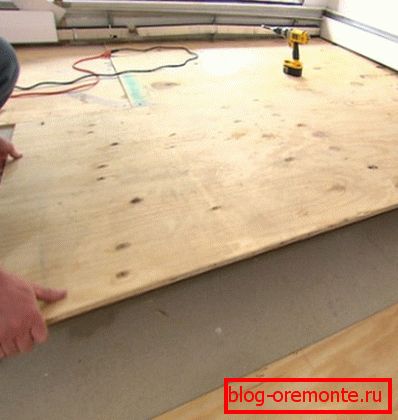
General provisions
Plywood consists of several thin layers of wood veneer, glued together with a waterproof solution.
It has a lot of positives:
- Absolutely flat and smooth surface, suitable for laying on top of any topcoat. If the screed has some flaws, then all of them will be eliminated by wooden flooring.
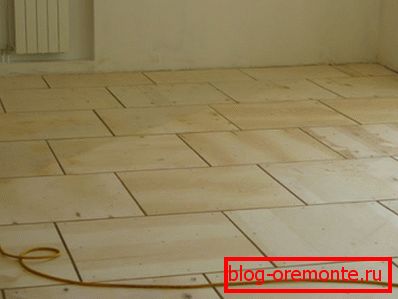
- Affordable price. The use of predominantly coniferous veneer allows you to keep a low cost.
- Low thermal conductivity. Unlike cold concrete.
- Soundproofing. Separate you from the noise of the lower neighbors, if you live in an apartment.
- Easy handling. Sections are easily cut to more convenient sizes.
Tip: for cutting is recommended to use an electric jigsaw. It will greatly simplify the task and allow you to achieve a better result.
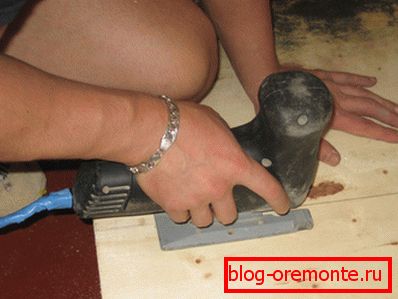
- Simple installation instructions. If you compare, for example, with the “wet” method of leveling a concrete floor, then the use of wood-laminated boards is more accurate and clean, not to mention the weight of the above advantages, which will be provided to you by a rough plywood base.
- Moisture resistance. Pine needles in combination with waterproof impregnation guarantee the absence of hydrophobicity.
Tip: in rooms with particularly high levels of humidity, it is recommended to use products with a PSF marking, which means the participation of phenol-formaldehyde glue in their manufacture, which is characterized by increased water-repellent properties.
- High strength and wear resistance, allowing to adequately carry all the burden and burden falling on the share of the underground.
- Ecological purity. The composition includes only natural ingredients.
Taking into account all the advantages of the building material under consideration, its widespread use in arranging floor structures becomes understandable.
Suitable types of glue
What is the best glue for laying plywood on a concrete floor? Consider several options that have their positive and negative qualities.
Dispersive

The components of this glue do not dissolve, but are and are mixed in a water dispersion medium. Such a structure ensures the ecological purity of the solution, so that in the process of solidification only completely harmless and odorless water molecules evaporate in the process of solidification.
But you should also have an idea about the difficulties encountered when using an aqueous adhesive composition:
- The need for additional fixation with steel screws and plastic dowels.
Tip: if there are communication elements in concrete, then without a detailed scheme of their location, you should abandon the use of dowel-nail fasteners. Because you can damage the wiring, after which you will need to cut the concrete with diamond circles to get to the breakdown and eliminate it.
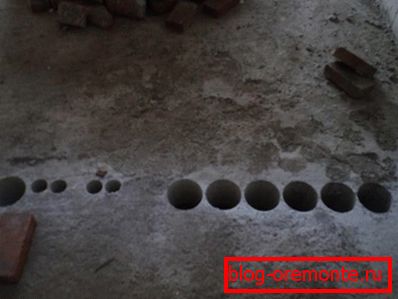
- Long freezing period of at least one week.
Before use, the solution is diluted with water or a special primer. Consumption is approximately 1.2 kg of glue per square meter of concrete.
Alcoholic
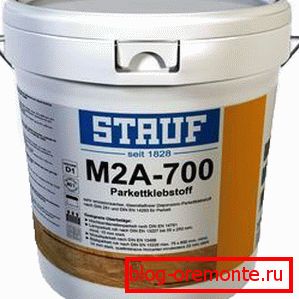
This glue is made on the basis of artificial resins or solvents. The presence of a specific smell makes use of a respirator during work and thoroughly air the room.
But you also get many benefits:
- Drying usually under normal conditions occurs in three days.
- The gaps and voids are well filled, which allows to achieve a higher density of the draft base.
- Remains elastic after curing, which prevents it from cracking.
In the case of operation of this solution, additional fixation with screws and dowels for concrete is also desirable. Its consumption comes to one and a half kilograms per square meter of cement surface.
Two component
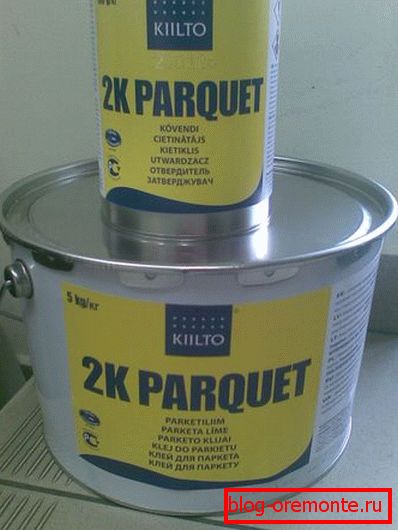
The cost of such a composition is higher than that of its counterparts, but also significant advantages are also greater:
- Additional fastening with use of the self-tapping screw-dowel system is not required. And this is a significant saving of time, money and effort.
- The shortest period of solidification is two days. That is, after 48 hours, you can start sanding the laminated board.
- The highest strength.
It is also important to keep in mind that before gluing plywood to concrete, it is necessary to prime it with a special solution to improve the adhesive properties and create a protective polymer coating.
Conclusion
Plywood is an excellent draft substrate for any finishing flooring. For its installation, various adhesive solutions are used, among which you can easily choose the most suitable one for your particular situation. It can be environmentally friendly dispersed glue, practical alcohol or the most effective two-component.
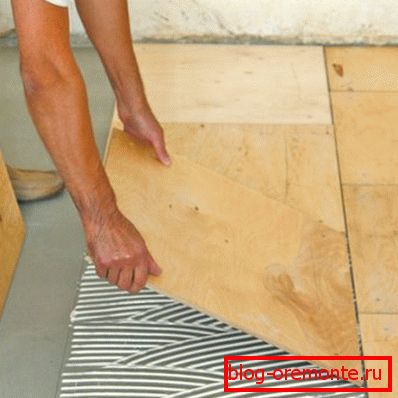
The video in this article will provide additional information directly related to the materials presented. Choose glue according to your preferences and capabilities.